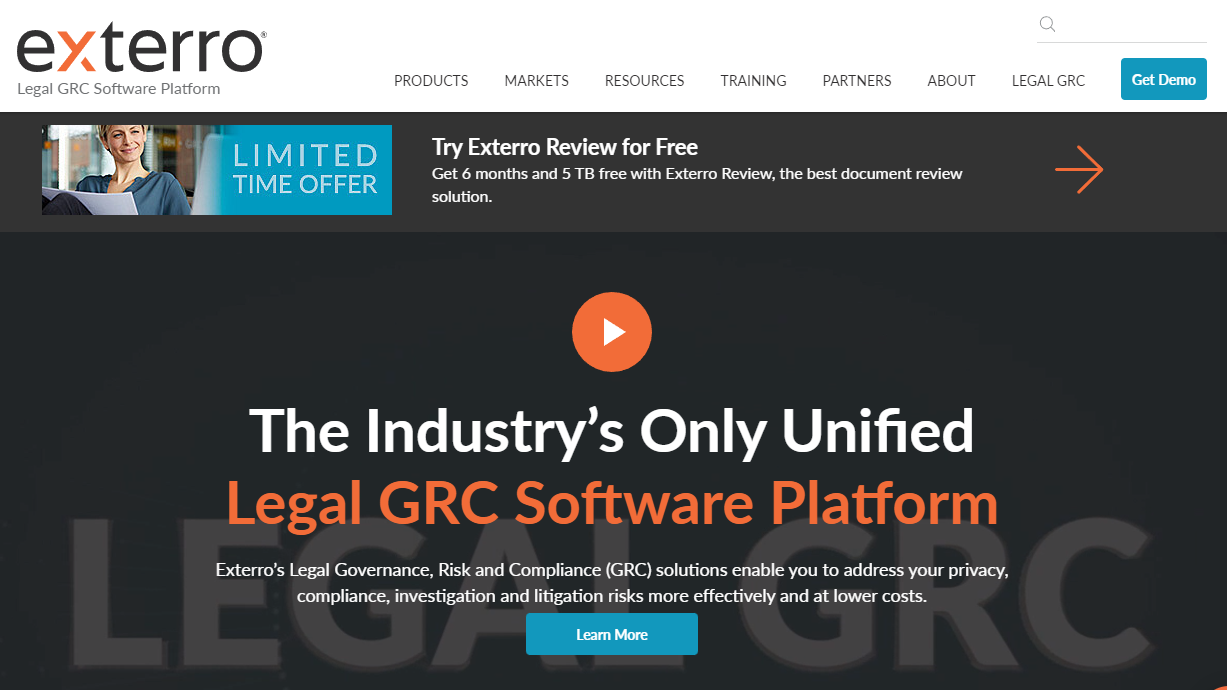Exterro, a provider of software for e-discovery, governance, risk and compliance, said today that it has completed a strategic recapitalization and secured additional committed equity capital as part of a continuation vehicle transaction that has provided it with “several hundred million” in new funding at a valuation of more than $1 billion, putting it among the handful of legal technology companies that have achieved unicorn status.
The transaction will enable Exterro to devote more resources to the growth of its portfolio of legal governance, risk, and compliance (GRC) software products through acquisitions and product development, continued expansion of its digital forensics customer base, reinvestment in its global Training Academy, and delivery of new products to new geographies, the company said.
As part of this transaction, Leeds Equity Partners, which invested more than $100 million in Exterro in 2018, has made a new equity commitment to the company from its latest flagship fund, Leeds Equity Partners VII. Also supporting the deal are a group of leading
global institutional investors (including Coller Capital, Glendower Capital and GCM Grosvenor), Exterro said.
Read about Exterro Review and Exterro E-Discovery Data Management on the LawNext Legal Technology Directory.
“Since our last funding with Leeds Equity, global demand for Exterro’s Legal GRC platform has grown exponentially, fueling our product innovation as we’ve continued building best-in-class e-discovery, data privacy, forensics, risk, and compliance technologies,” said Bobby Balachandran, founder and CEO of Exterro.
“As the lines between legal, finance, IT, and security departments blur, Exterro is in a unique position, offering the only platform that can effectively unify and address the data and the legal requirements of those disparate business silos. Leeds Equity has been an incredible partner in Exterro’s growth, and we are thrilled to continue our partnership with them as Exterro enters this new phase of growth.”
Leeds Equity’s initial investment in Exterro in 2018 was, at the time, the largest direct investment ever in a legal technology company. Since then, Exterro has more than quadrupled its revenue, and now serves more than 3,000 customers in more than 12 countries throughout the world.
On LawNext: Exterro’s Bobby Balachandran, ‘LegalTech CEO of the Year,’ On Leadership, Growth and Plans for an IPO.
In December 2020, Exterro acquired AccessData, then one of the world’s largest providers of digital forensic investigation technology, which Exterro said at the time made it the only company to address governance, risk, compliance and digital investigations in a single platform.
In June 2019, Exterro announced that it had acquired Jordan Lawrence Group, a company that provides data privacy and data management software.
While Exterro’s principal markets are corporations and, to a lesser extent, law firms, it says it has made significant inroads within law enforcement forensics departments, where its most recent client is the United Kingdom’s West Midlands Police Department.
“Bobby Balachandran and the entire Exterro team have built an industry-leading business uniquely positioned to help companies manage and analyze data and drive actionable business intelligence,” said Jacques Galante, partner at Leeds Equity Partners. “These are critical requirements to operating in the face of challenges across e-discovery, data privacy, cybersecurity, and forensic investigations.”
Earlier this month, Balachandran, who founded Exterro in 2008, was named to the 2022 Fastcase 50, honoring law’s “smartest, most courageous, innovators, techies, visionaries, and leaders.”. In 2021, he was named LegalTech CEO of the Year in the Legaltech Breakthrough Awards.
A Massive Opportunity
In a recent interview, Balachandran told me that the growth of his company has been driven by the fact that, for companies, data is their most valuable asset, but it is an asset that also exposes them to massive levels of risk.

Bobby Balachandran
“Our mission is, how do we allow organizations to use the power of the data without all the associated risks around legal governance and compliance.”
All of that presents a massive opportunity for Exterro with significant headroom to grow, he said. Specifically, customers want an integrated platform that addresses all areas of governance, risk and compliance.
“So it just made sense to bring in more financial power for us to make acquisitions that are strategic and to invest — we are an innovative company, as you know, but we want to triple down on investment in our products to provide what our clients are looking for, and for increasing talent, adding more talented people across the world and across different industries.”
When I interviewed Balachandran last December for my LawNext podcast, he said he was considering an IPO in 2022. When we spoke recently, he said an IPO is still on the table — now probably for 2023 — but that he views this as a pre-round to be sure Exterro has all the ingredients the public market may be looking for, especially given the current state of the market.
“I think it’s prudent for us to wait until the market settles and comes out of this bad place,” he said. “It’s an opportunity for us to double down on our investment and show our customers that we will come out of it strong.”
By bringing in new investors in this deal, Exterro has been able to provide liquidity for its management team, Balachandran said, while keeping the board dynamic in place. Neither he nor Leeds is selling any stake as part of this round.
The company will continue to focus on governance, risk, compliance and e-discovery, Balachandran said. “In each of these areas, we are extremely strong and there are significant opportunities.”
The key, he suggested, is in providing an integrated platform that allows customers to handle all aspects of e-discovery and GRC without having to shuffle data from one platform to another.
While Exterro’s platform is “already there,” he said, he believes there is significant opportunity for continuous innovation. That can be by doubling down on development or by acquiring technology that someone else has developed.
“The opportunity we see is that we very uniquely have a point of view on the governance and the GRC side and the risks that data creates across multiple markets, and of how the convergence of it makes it such a hairy problem for customers, who are spending millions and millions of dollars to solve it.”
 Robert Ambrogi Blog
Robert Ambrogi Blog